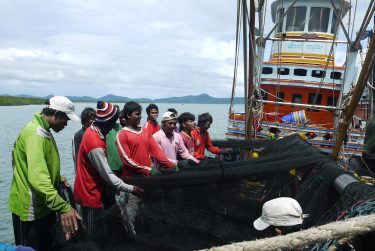
In recent years, investigative journalists at the Associated Press, the Guardian, The New York Times and other outlets have uncovered human rights violations happening on fishing vessels around the world.
Their reporting shed a light on the widespread use of slave labor in Southeast Asia, as well as how that practice impacts the seafood that winds up on our plates in the U.S. The conditions these fisherman — and fisherwomen, who make up more than 50 percent of the world’s fisheries sector workforce — experience is unfathomable. They’re often tricked and trapped into working 22-hour days, in many cases without pay and while enduring abuse.
As a response to these investigations, marine scientists from the University of Washington, Conservation International and other organizations are calling for their peers to focus on social issues in the seafood industry. In an article published on June 1, they identify areas that would establish a global standard for social responsibility in the seafood industry, including:
- protecting human rights, dignity and respecting access to resources;
- ensuring equality and equitable opportunities to benefit;
- and improving food and livelihood security.
“We argue that committing to sustainable seafood sourcing and supply is also about ensuring people who work in the food business ― whether as harvesters or processors and packers ― have decent work,” said co-author Edward Allison, UW professor in the marine and environmental affairs. “It is also about ensuring communities who rely on the sea economically and culturally, particularly coastal indigenous communities, don’t have their harvest rights appropriated by powerful outside interests.”
Read more at UW Today »
